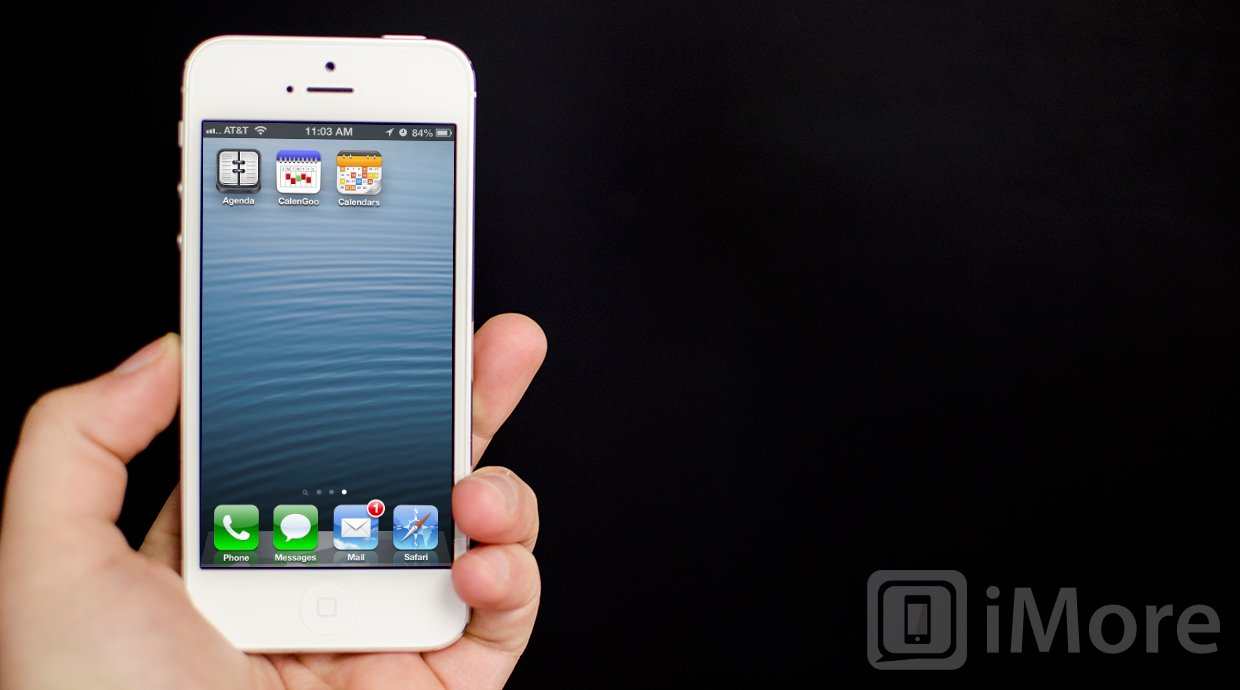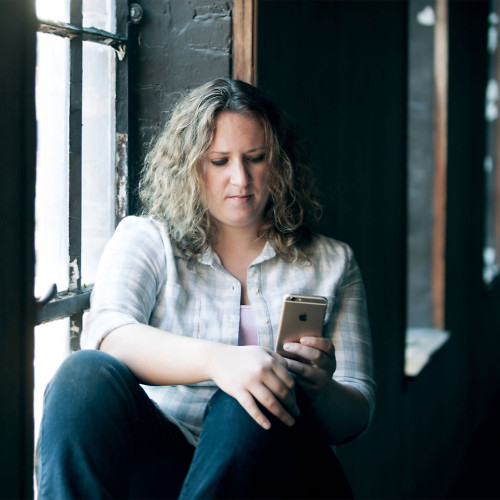If you don't like the default Calendar app that comes with your iPhone, the App Store is filled with alternatives. Whether you want something more simple and elegant, more powerful and robust, or just something that works more the way you work, you have options to consider. Agenda, CalenGoo, and Calendars by Readdle all give you even more control over your calendars, events, and notifications than the default Calendar app does, and all organize things in a different way. But which one is best, and more importantly, which one is best for you?
Agenda vs. CalenGoo vs. Calendars: User interface
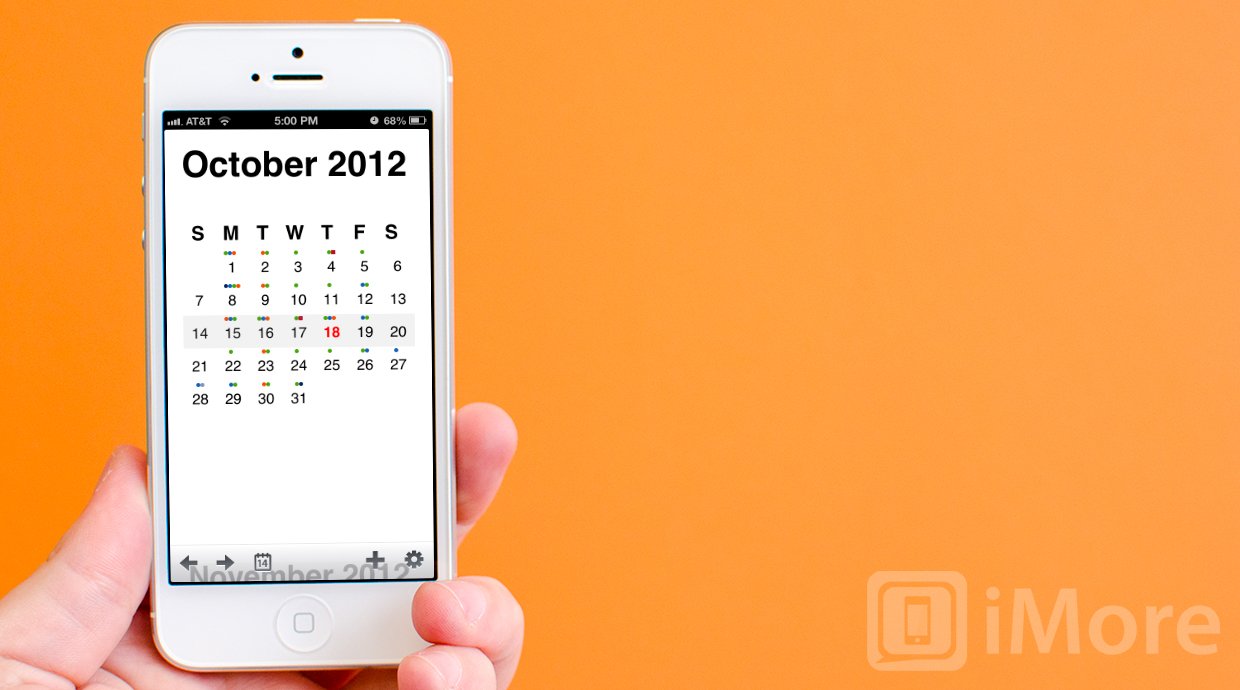
Agenda for iPhone is simple and clean. The interface is minimal but still manages to be powerful at the same time. If you enjoy the way the default Calendar app looks but don't think it offers enough functionality, Agenda is a happy medium between the two. You can turn on an option that allows event creation to look just like it does in the default calendar app. This is something users of the default iPhone Calendars app will like and will most likely help make for a smooth transition.
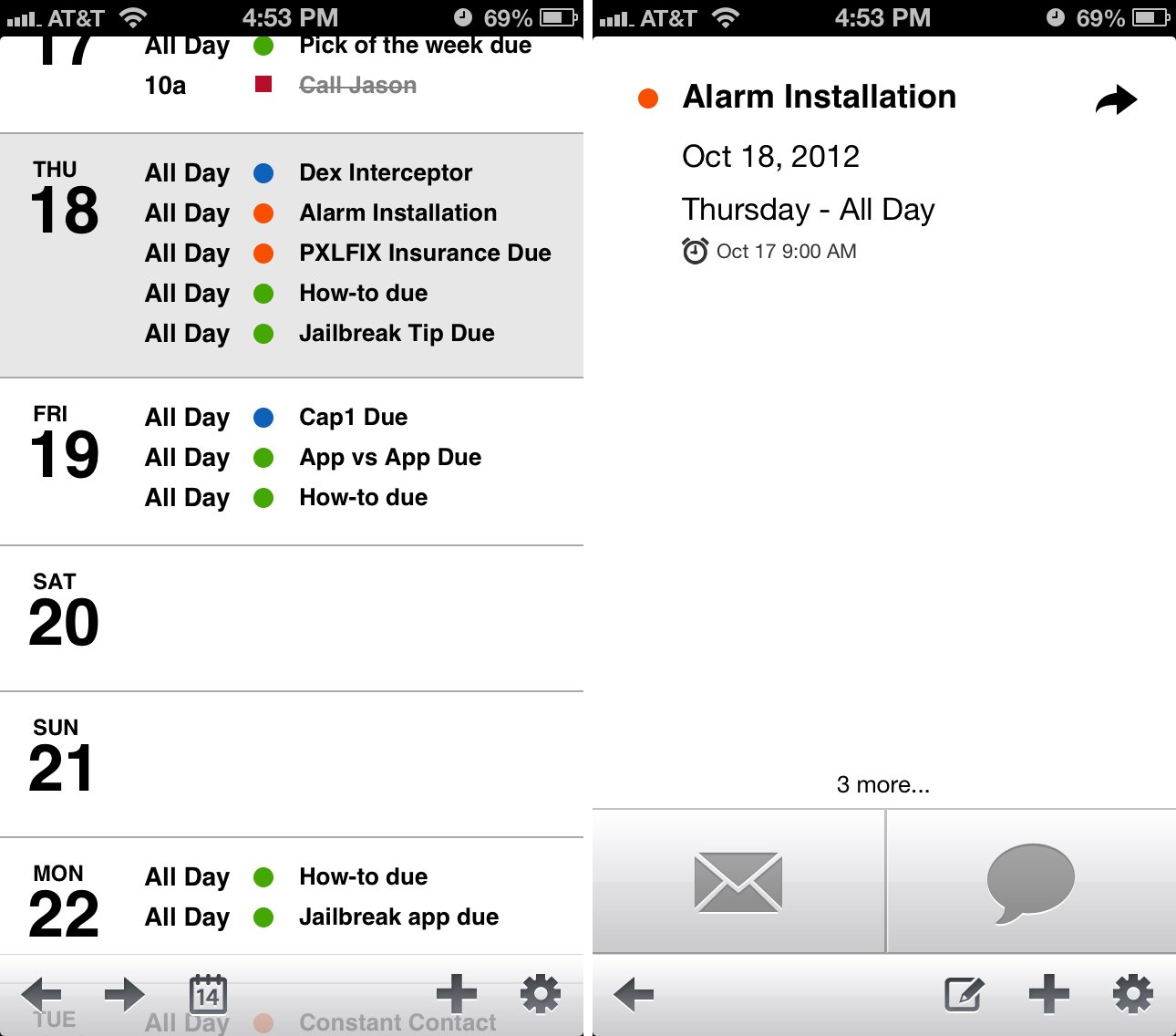
When initially launching Agenda it'll ask you if you'd like to migrate calendars and what services you'd like to set up. Once that's done you'll be brought to a screen that shows a list view of everything in your calendar. You can flick through it or tap into certain days to get a better idea of what you have going on for that day. From here you can tap into a single event and view it, edit it, share it via e-mail or text, and more.
The menu bar in Agenda is easy enough to navigate as well. Along the bottom of the main screen you'll see arrows that allow you to toggle between month, week, and year view. Next to those you'll see a calendar ticker that allows you to jump to any given month and year. To the right you have a "+" icon which is used to add events to your calendar. Next to that is a gear icon which gives access to your settings. This icon remains static throughout any screen you may be on so you can easily jump into settings from wherever you are.
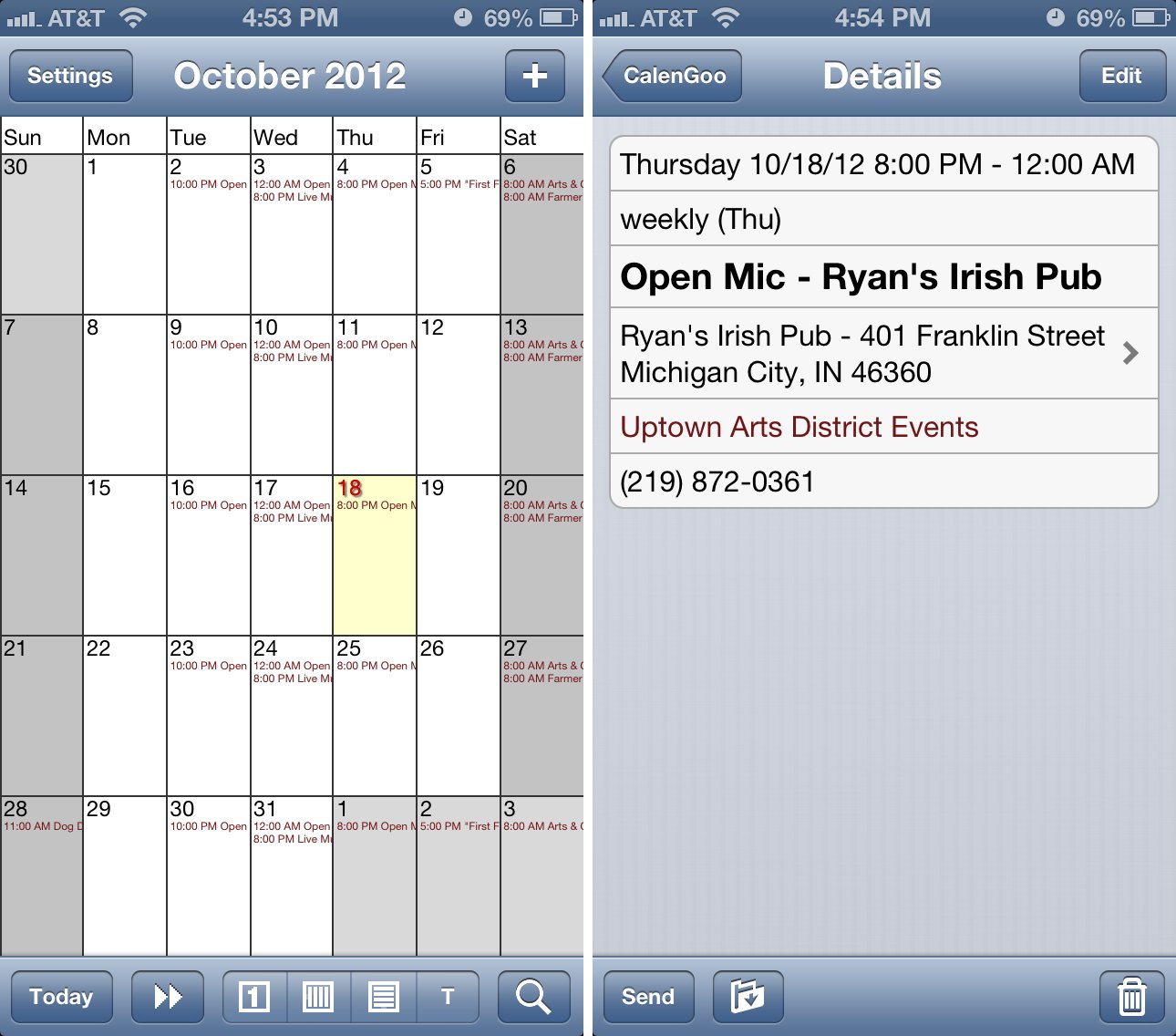
CalenGoo syncs natively with Google Calendars. After the initial sync you'll be brought to a main screen that shows a month by default. Your main navigation items will be located along the bottom while settings and adding events are handled from the top navigation bar. CalenGoo allows you to view day, week, month, and list views. There is also a quick button that's located in the bottom left that lets you easily jump to events for the current day. To the far right you've got a search option that lets you search for calendar events.
Adding an event to CalenGoo is easy enough and can be done by tapping the "+" symbol in the upper right hand corner. You'll be prompted to enter a title for the event and then enter the details. Once you're done and hit save it'll be added to your calendar. CalenGoo will use the default calendar colors that you already have set up through Google Calendars.
The settings section of CalenGoo gives you access to all kinds of options that can help you customize the app to your liking. While CalenGoo does allow you to customize pretty much everything imaginable, the settings panel is pretty complicated and the amount of options may be overwhelming to non-advanced users. If you aren't an advanced user, it doesn't mean the app won't serve your purposes, just leave everything at default and only change things you need to and you should still be good to go. I found CalenGoo's defaults to be more than sufficient for my needs.
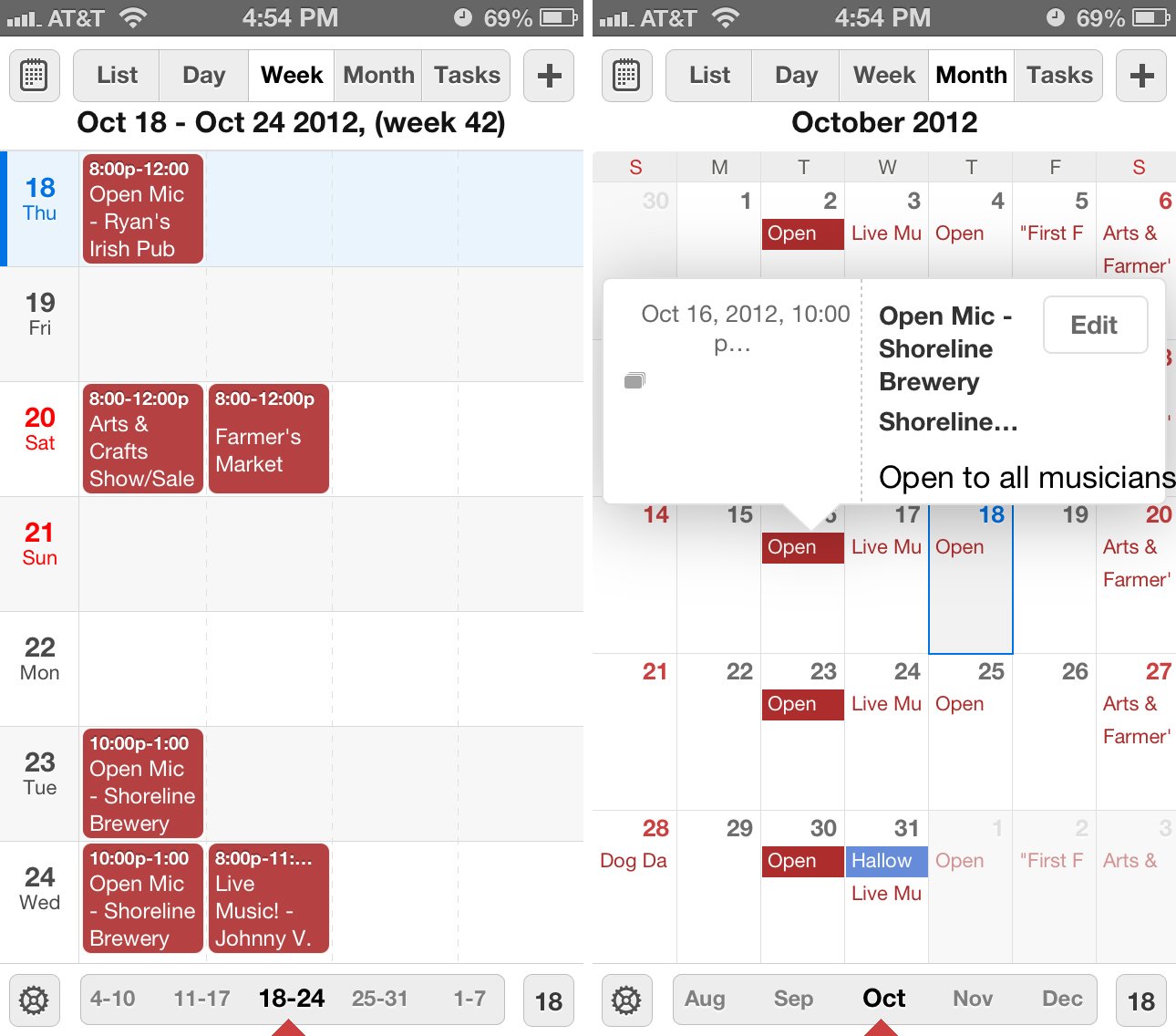
Calendars by Readdle is quite similar to CalenGoo when it comes to user interface at first appearance but the controls are actually quite different. Along the top menu of Calendars you'll have a calendar button that allows you to show or hide calendars from view followed by a menu that lets you toggle between list, day, week, month, and tasks view. The far right top corner has a "+" sign that you'll use to add events.
The menu running along the bottom allows you to access Calendar's settings or quickly slide through months with the date changer. In the bottom right corner you will see today's date. Tapping on it instantly brings you back to the current day.
Adding an event in Calendars is easy. Just tap the "+" symbol in the upper right hand corner and you'll be brought to the event creation screen. Here you can choose your event title, what calendar you want to add it to, and more. Once you're done just tap Save and it'll be added to your calendar. There's nothing tricky or confusing.
The settings panel in Calendars allows you to change quite a few options including what view you'd like to be set as your default. If you always want the app to load the way you left it you can choose the Last Used View option to do so.
Agenda and Calendars both have better interfaces than CalenGoo. If you want something clean and simple and don't need a ton of extra customization options, Agenda is a great choice. Calendars by Readdle's settings are easy to navigate but give you more powerful control than Agenda and for that, it's a tie between the two when it comes to interface and design.
Agenda vs. CalenGoo vs. Calendars: Organizing, sorting, and sharing
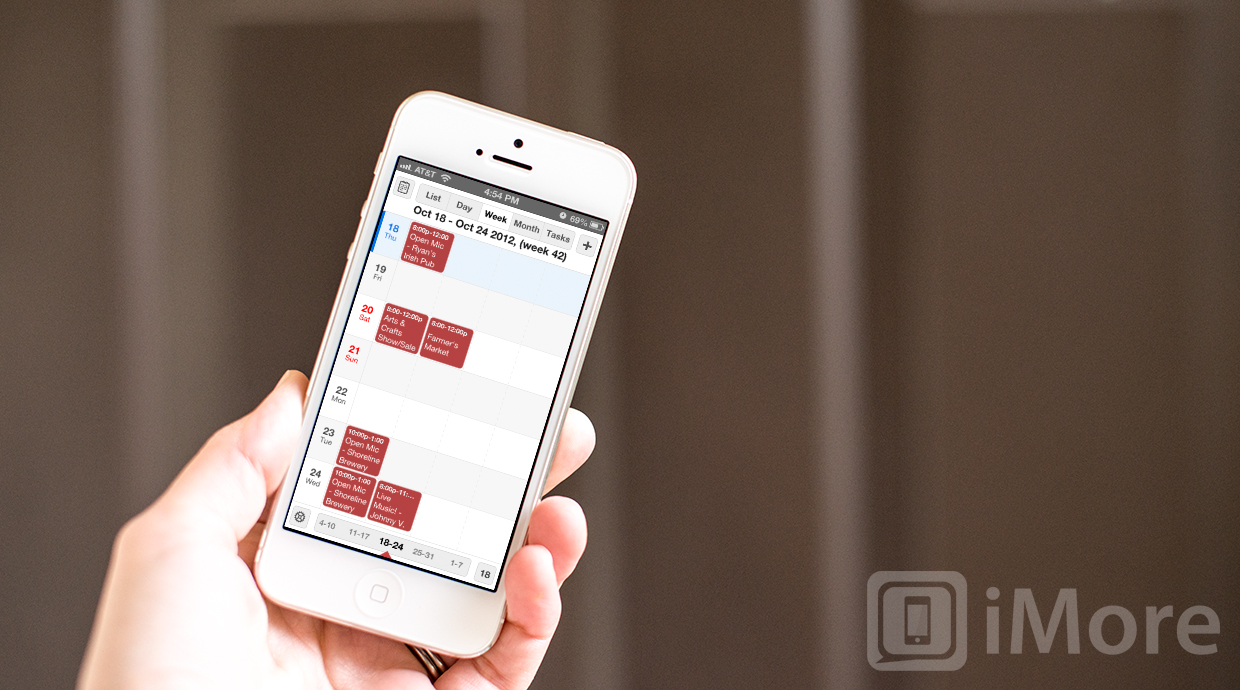
Agenda is not only a beautiful app but makes it easy to see what you want, when you want to see it. Agenda will automatically pull the calendar colors you already have configured on whatever service you're using to make it easy to pick out what event or reminder belongs to what calendar or list.
When it comes to sorting, you can tap into the settings panel of Agenda at any time and then into calendars and turn on or off any calendars you do or don't want to view at a given time. If you're on vacation you can easily tick off work reminders, alerts, and events from appearing. Even though you're hiding them it won't disable alerts for those calendars which is good if you want to still receive alerts but bad if you don't want them.
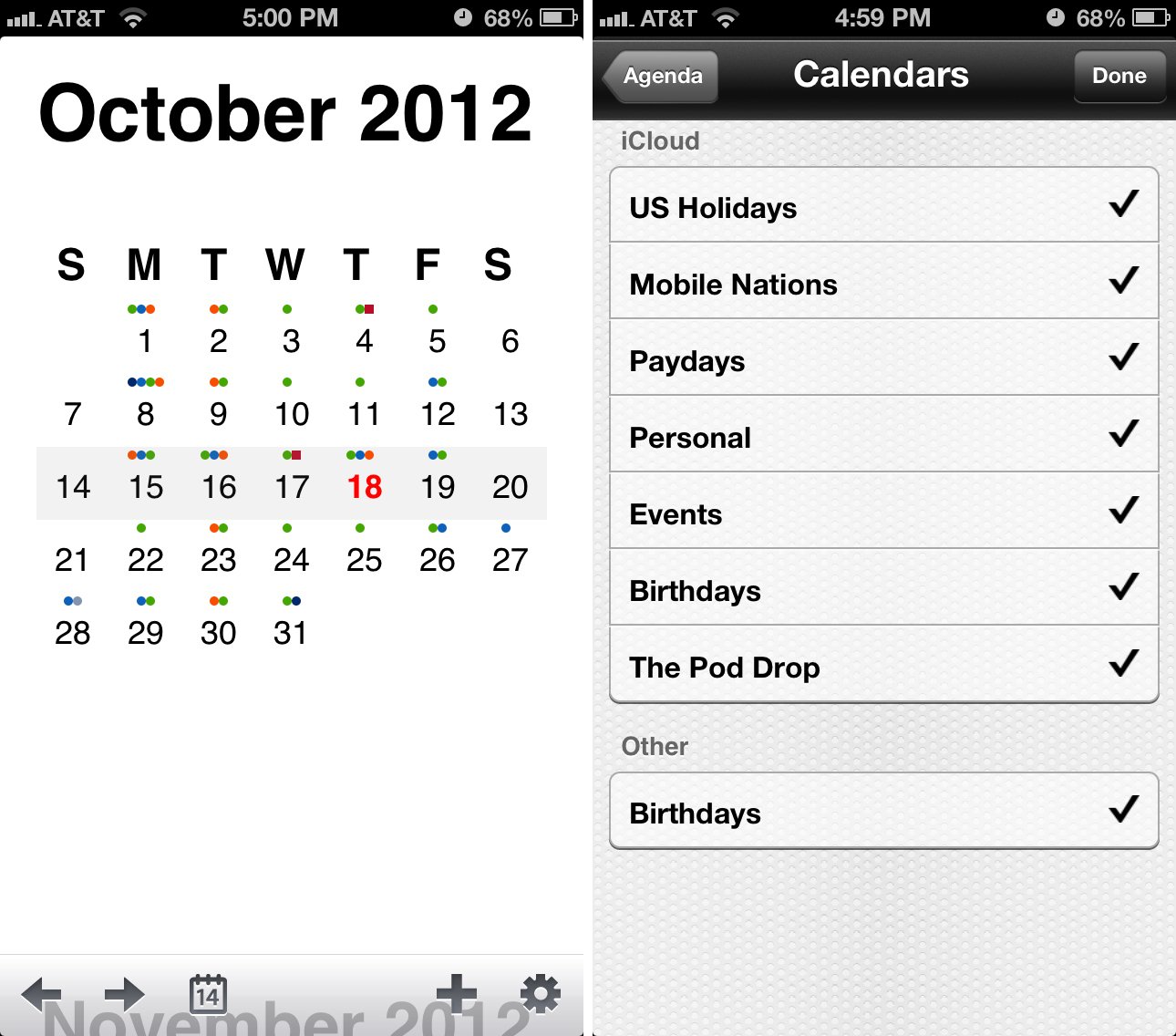
After choosing the "+" sign to add an event, you can toggle along the top to choose between event and reminder creation. Just as a side note, if you've got the iOS Event Creation option chosen in Settings, you won't have the option to create reminders in Agenda. You'll have to make sure this feature is turned off if you want Agenda to handle your reminders as well. Once you've created an event or reminder, it'll instantly be added to your calendar and will sync with whatever service you're using.
If you'd like to share an event or reminder with someone else you can easily do so in Agenda by tapping on the arrow next to the event name. You can e-mail the entry or copy it. If you want to inform someone you're running late, on time, or any other message of your choice you can choose the message or text icon towards the bottom. You can then customize the message or send an update to whoever you'd like from the default templates available. This is an extremely nice feature and something a lot of calendar and event apps lack.
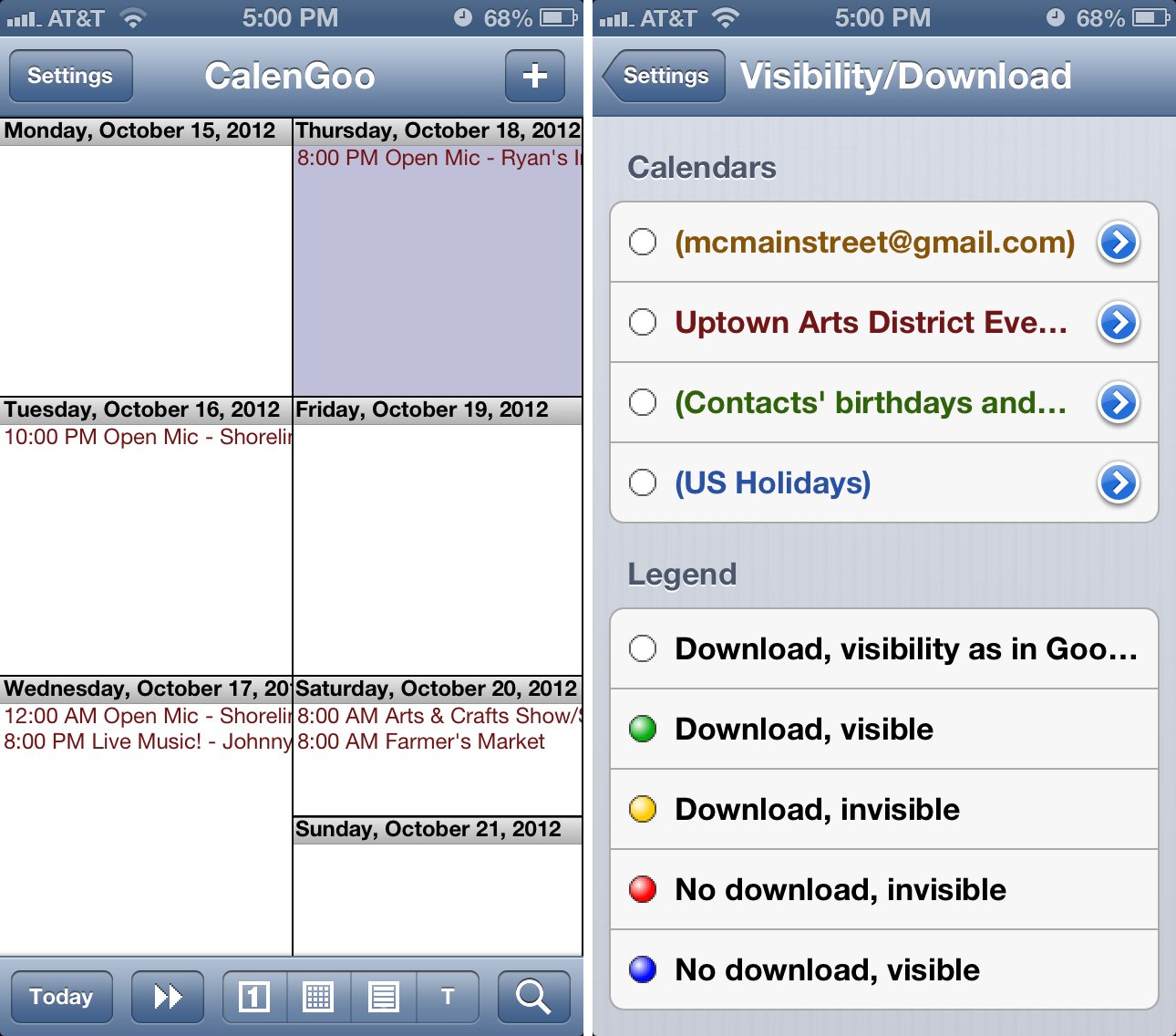
CalenGoo also will use the default calendar colors from Google Calendars. If you'd like to hide certain calendars, you can do so within the settings panel. You can also choose to create calendars and tasks that don't show up in Google Calendar if you choose to do so. While the settings panel may be overwhelming to some users, advanced users will greatly appreciate the flexibility and control they have over their content with CalenGoo.
When it comes to sharing events, you can easily do so in CalenGoo by choosing the Send button by any event. You'll then have the option to e-mail or send the event as an SMS to any contact or e-mail address. You can also choose to save the event as a template by choosing the envelope with a down arrow icon next to the send button. It's a nice feature for things you may need to set up later but aren't quite sure on dates now.
While CalenGoo is extremely powerful, the menu setup is a little strange. Whenever you click on a view, that button will change to accommodate the view that isn't shown. It's a little weird and none of the buttons ever remain static. This would confuse me when trying to get to certain views.
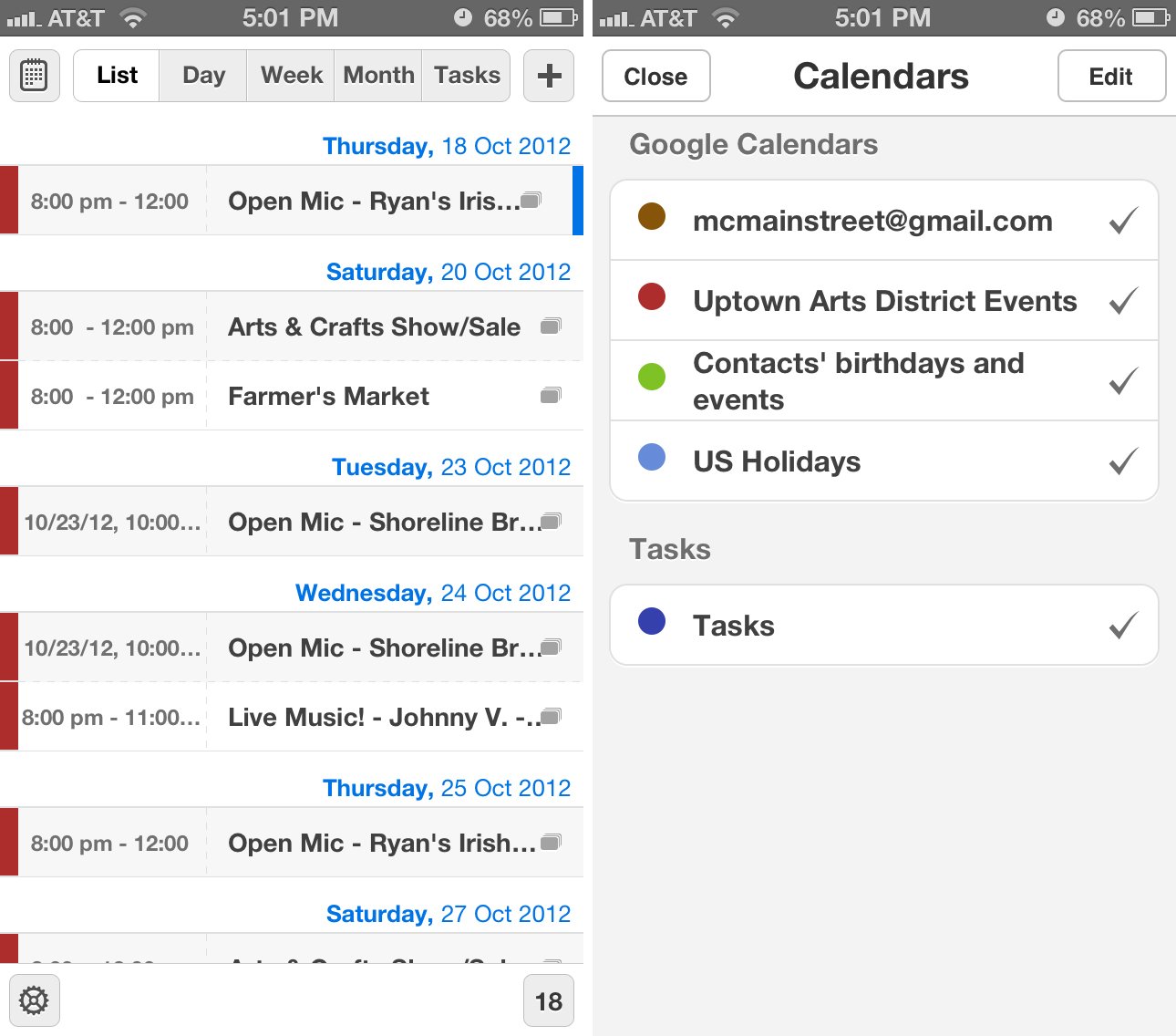
Calendars by Readdle has a nice menu system within it that lets you quickly sift through and sort calendars as you wish. Just slide the date slider to the left or right to quickly page through months, days, or weeks. If you have a lot of calendar entries and need to find something in a certain calendar, just tap the calendar icon in the upper left hand corner and hide other calendars to make it easier to find things. This is a feature that both Agenda and CalenGoo hide in the settings panel. Calendars makes things easy to find and the app more practical to use.
Single tapping on any event will show you a preview of that event. Unfortunately there is no way to expand it. Tapping edit will, however, allow you to add attendees and view additional information or change anything you need to. Again, Calendars just like both Agenda and CalenGoo will use the same colors for your calendars that you already use.
Along the top you'll be able to toggle views and if you have tasks enabled in settings, you'll see the addition of a tasks tab. Tapping on it gives you a list of the tasks you have for any list you've got configured in Google. To create a new task you'll need to be in task view before clicking the "+" sign. If you're on any other screen it'll default to event entry which for most, isn't a problem and probably a preferred method anyways.
Agenda offers the best solution when it comes to sorting, organizing, viewing, and actually interacting with your events and tasks. It's simple and clean but yet still more powerful than the default iPhone Calendars app.
Agenda vs. CalenGoo vs. Calendars: Alerts, notifications, and recurring entries
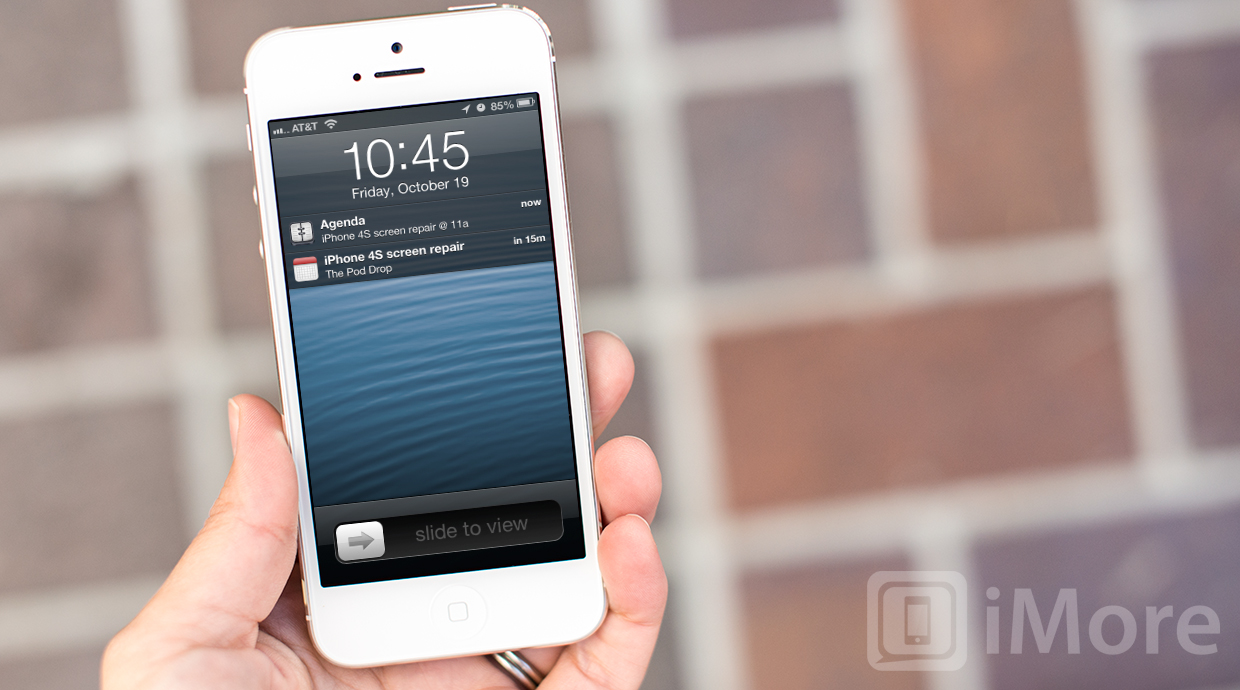
Agenda allows you to customize alerts and notifications under the settings panel. You can choose to use either the default or one of 8 other notification tones. You can also choose the time for which you want Agenda to alert you of an event or task. You can choose between several options including at the time of event, minutes before, hours before, or days before. You change the all day event alert time the exact same way as you would for regular events.
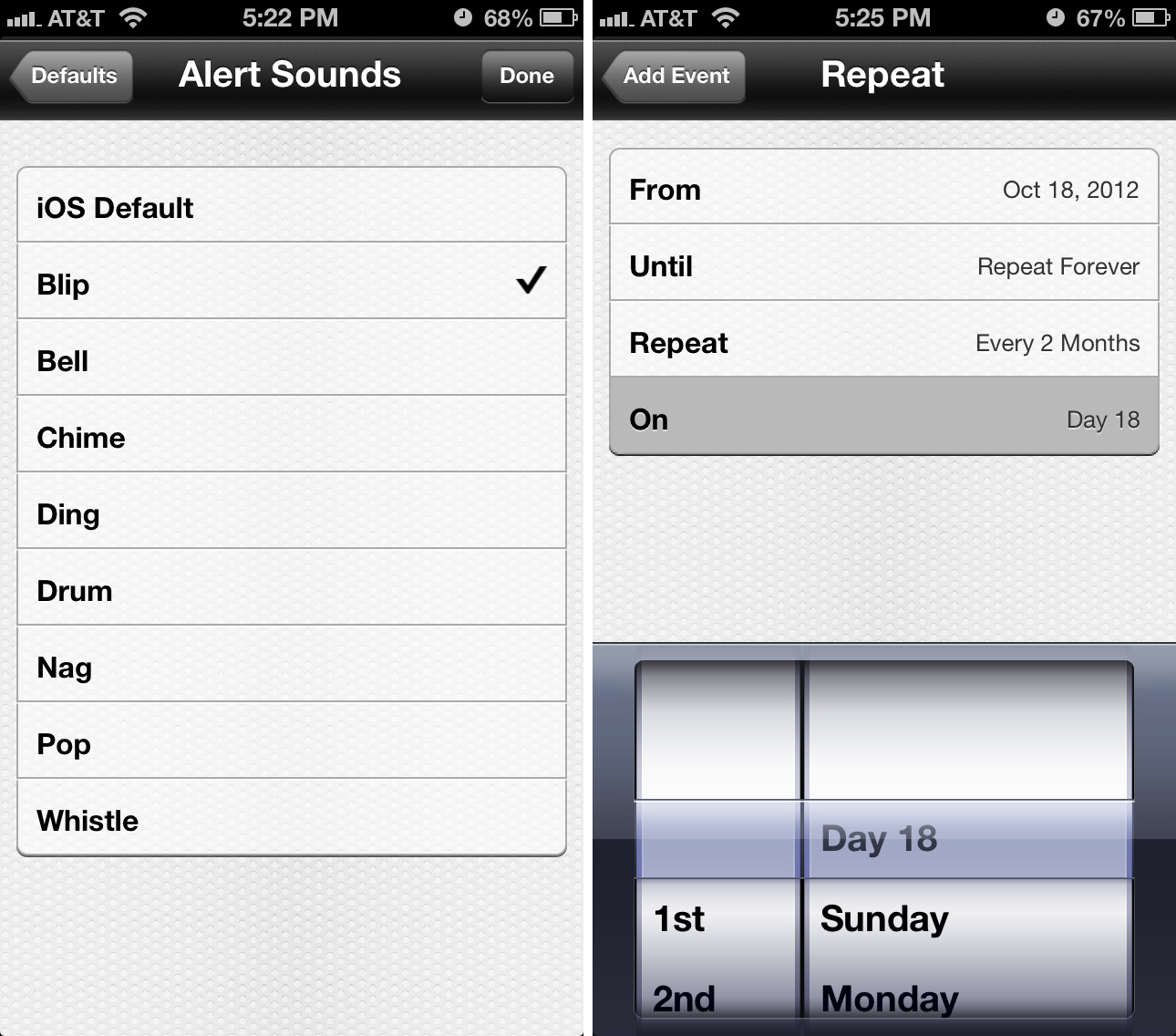
Recurring events in Agenda are better than the default iPhone calendar app. You can choose between day, week, month, or year which is the same as the default app but you can choose not only a start and end date which is an ability the default Calendar app doesn't give you but also intervals at which you'd like them to repeat. For example, you can have an event repeat every 3 weeks or every first Friday of the month if you'd like.
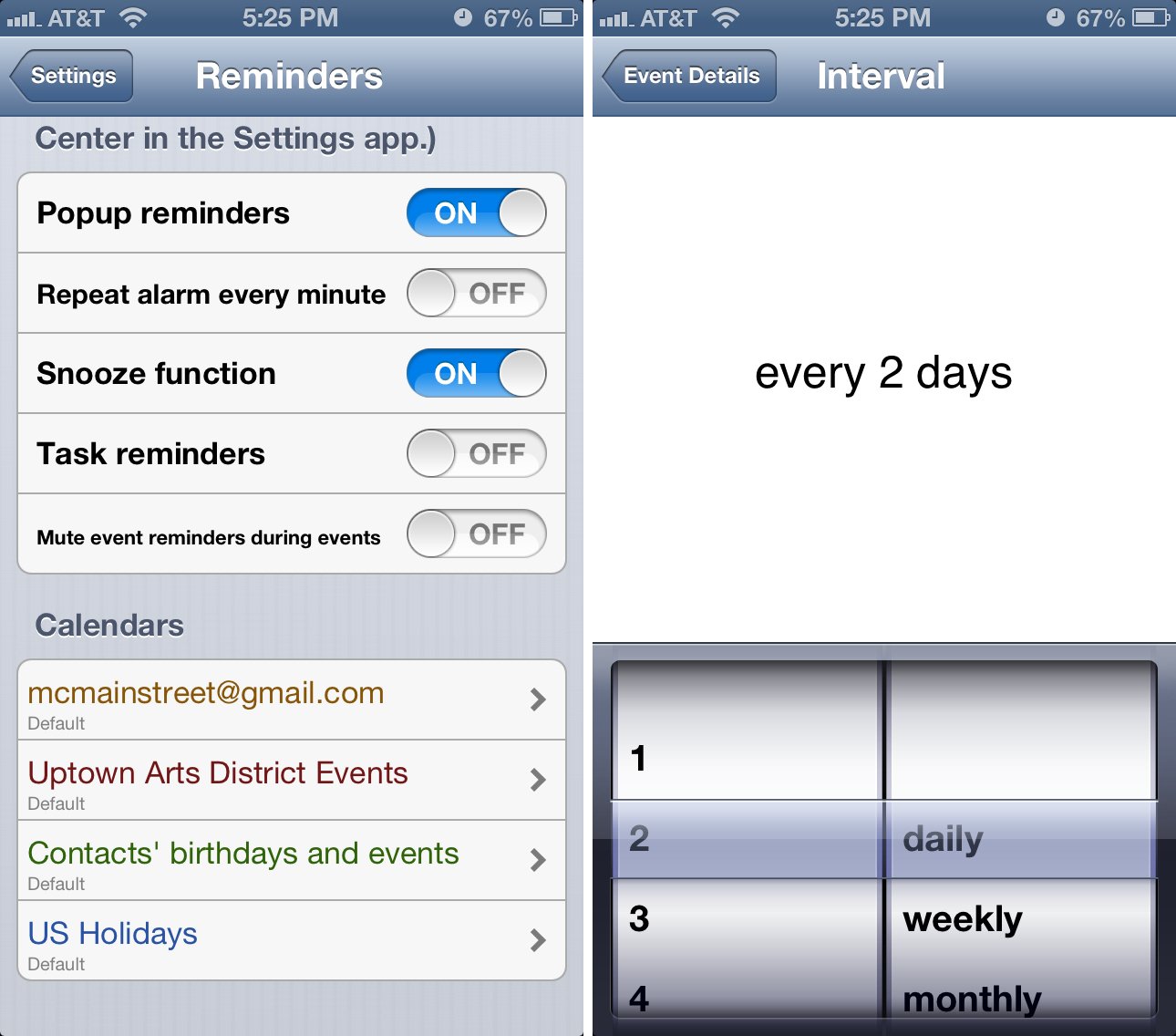
CalenGoo does alerts a little differently. You can set different alert tones for different calendars and tasks through the settings panel as well as customize what kind of pop ups you want or choose no pop ups. It's a little bit of a hassle to configure at first but once you've got alerts set up how you want them, you're good to go.
Recurring events inside CalenGoo are a lot like Agenda and allow you to choose specific increments as well. Which means you can have an event set to recur every 2 days if you'd like just like you can in Agenda. You can also change the events from recurring endlessly or limited to a certain date. These are nice for times when you have conference series or events that may repeat every few days or weeks but have a definitive end time.
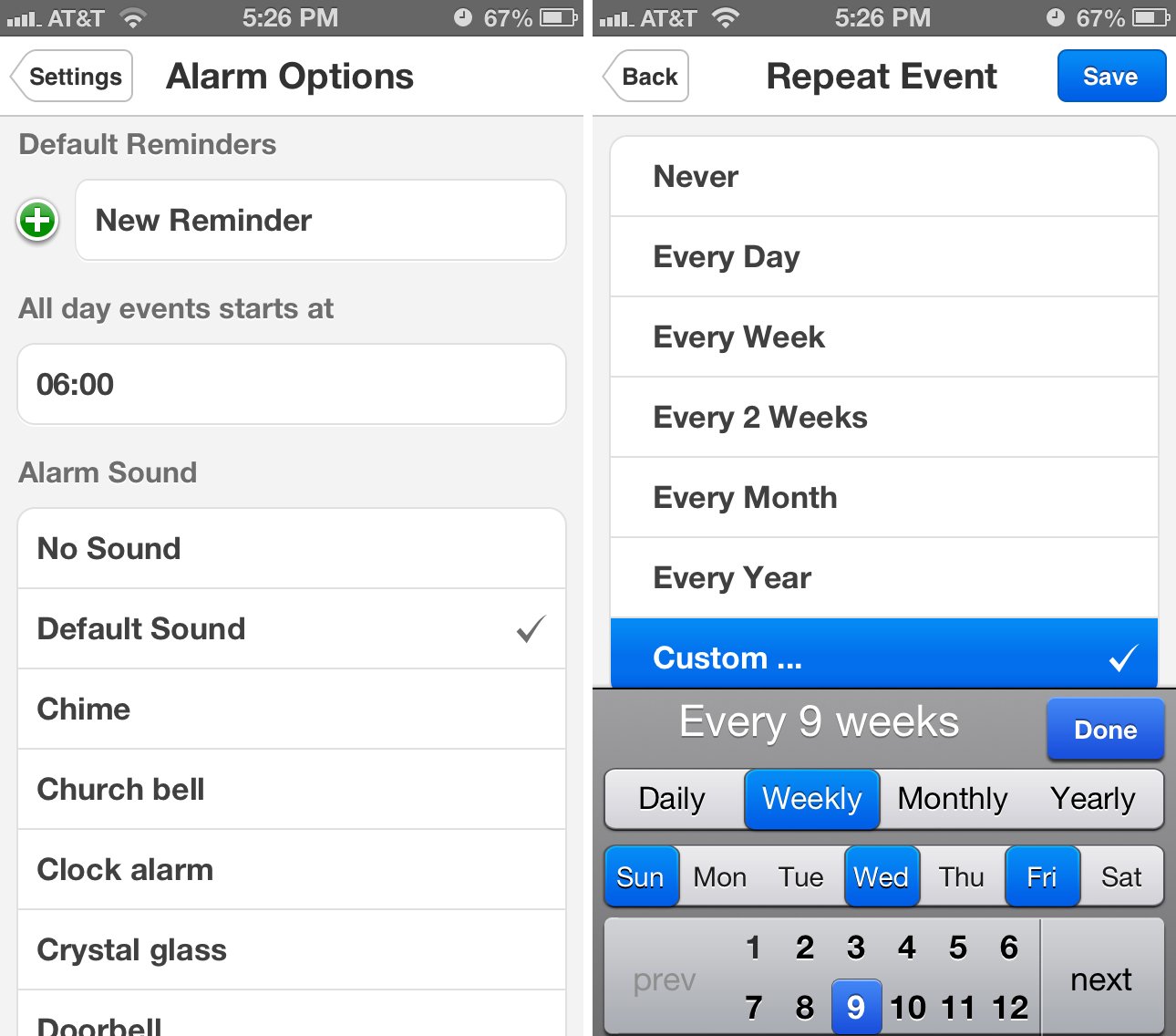
Calendars by Readdle has a total of 15 alarm and alert tones to choose from and you can change them at any time through the settings panel. The same panel in settings also allows you to choose what time you want all day events to start, which is when they'll populate in your calendar.
Recurring events in Calendars is the most robust of all three options. You can choose from the daily, weekly, monthly, and yearly presets or choose the custom option. With this option you can customize reminders virtually whatever way you'd like. You can have events repeating endlessly any days of the week you'd like.
When it comes to alerts and customization, all three apps handle alerts very well but when it comes to recurring events, Calendars by Readdle wins that battle but only by a slight margin since Agenda can do the same intervals and types of recurrences. The only reason I give the edge to Readdle is the fact that they're easier to configure and understand.
Agenda vs. CalenGoo vs. Calendars: Supported services
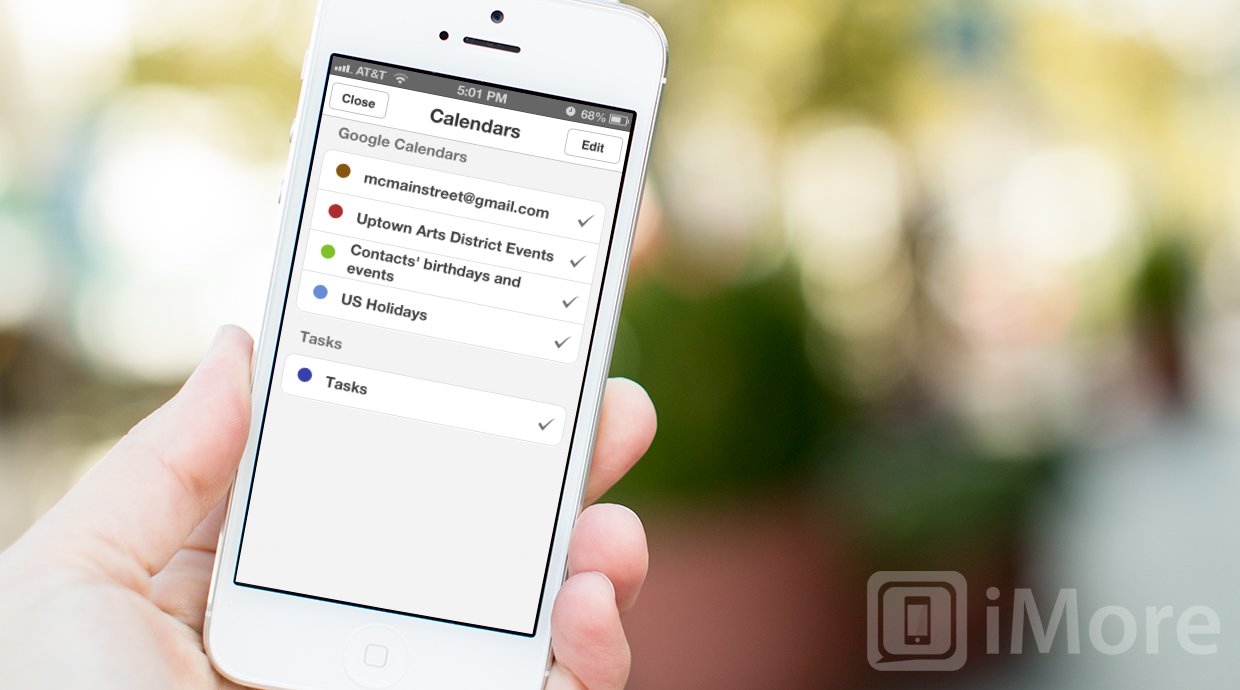
Agenda supports sync with iCloud, Google Calendar, and Exchange natively. If you've got any of these services, you'll be good to go. The first time you start up the app it can import all your events into Agenda from the default iPhone calendar app for you. You can also choose to keep them in sync and any changes you make in Agenda will appear in your iPhone calendar and vice versa. Google Calendar and Exchange support will work in the exact same way.
CalenGoo only currently provides support for Google Calendar, as its name implies. If you only use Google Calendar, it's just as good of an option as the other two.
Calendars by Readdle supports both Google Calendar services and the built-in iPhone calendars app so if you've got events saved in either one it'll be able to pull them effortlessly.
Even though Agenda and Calendars by Readdle carry the same support, Agenda syncs much more seamlessly and with very little effort. For users that have shared events in iCloud, CalenGoo and Calendars by Readdle don't always seem to sync to the default app very well or without some effort on your part. So if you're looking for a solution that makes your life easier and less complicated, Agenda is the best option for you.
Agenda vs. CalenGoo vs. Calendars: Cross-platform support
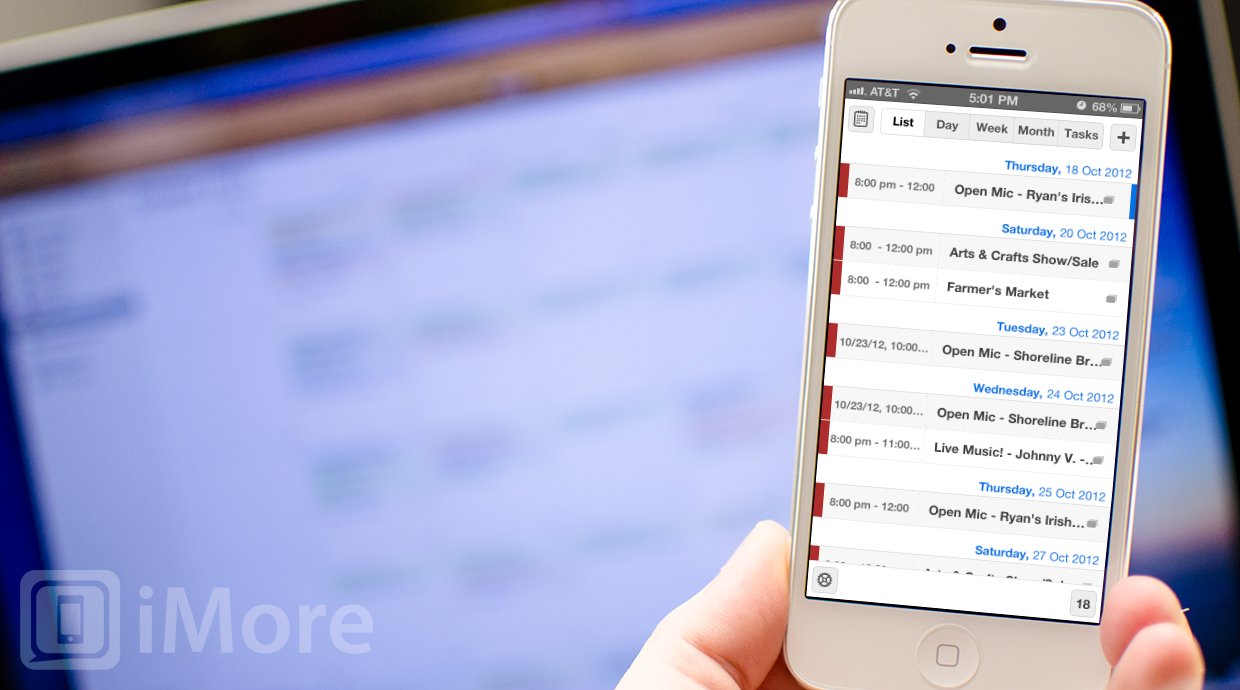
Agenda, CalenGoo, and Calendars by Readdle are all universal downloads for iPhone, iPad, and iPod touch. Once you purchase any one of them, you instantly own the app for all your other iOS devices as well.
If you're looking for Mac support, none of the three currently have Mac counterparts. Most likely due to the syncing support the apps already carry.
Tie between Agenda, CalenGoo, and Calendars.
Agenda vs. CalenGoo vs. Calendars: Pricing
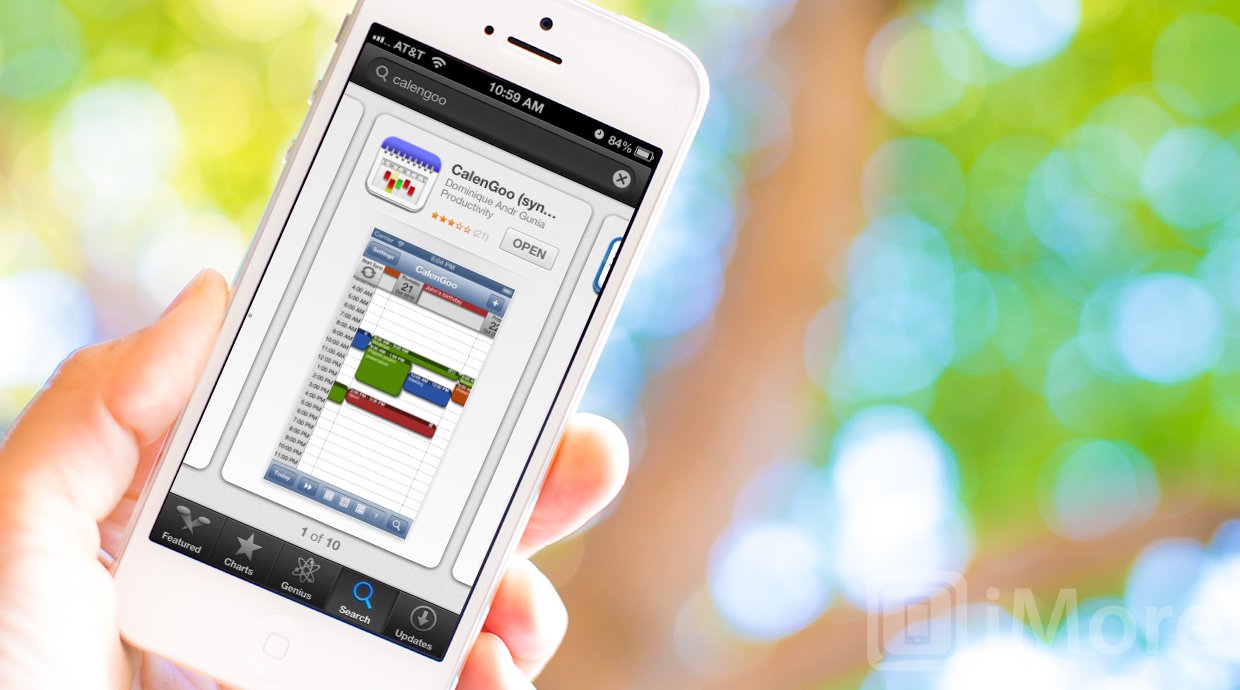
Agenda is currently priced at $0.99 which will get you the app for any iOS device you own. CalenGoo and Calendars by Readdle are both priced at $6.99 and just like Agenda, it'll get you the universal version that's optimized for iPhone, iPad, and iPod touch.
If price is an important factor to you, Agenda is a great app and at $0.99, you really can't beat it.
Agenda vs. Calengoo vs. Calendars: The bottom line
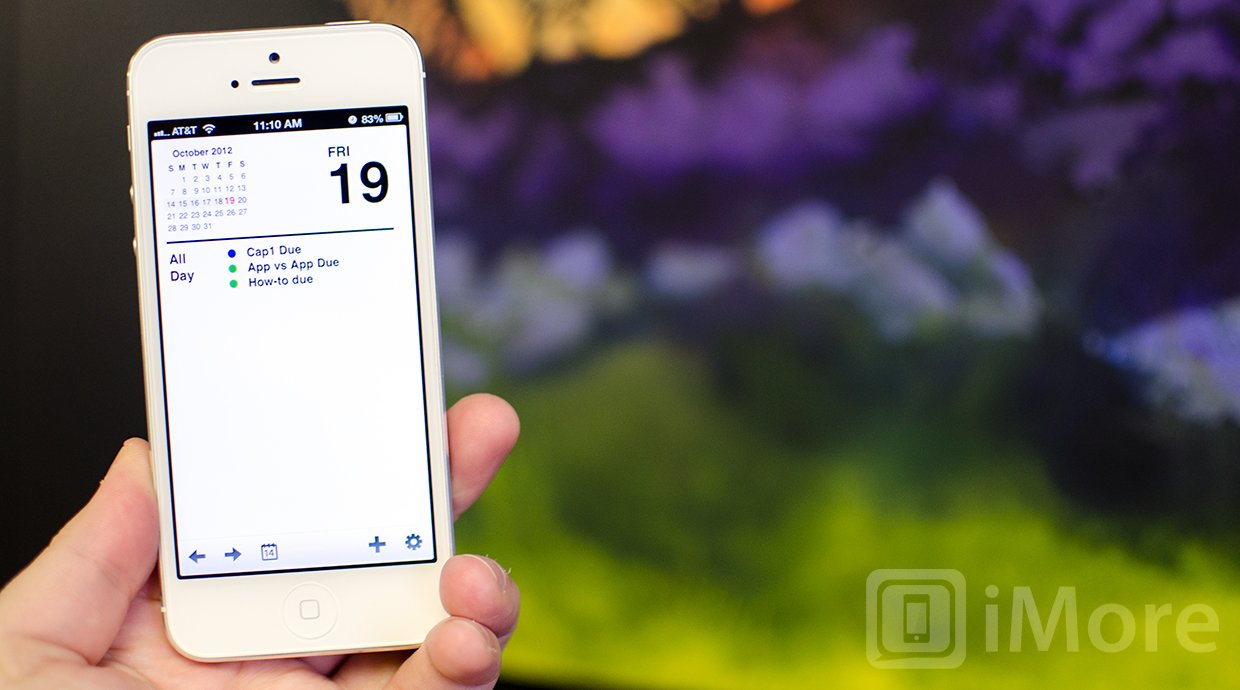
There's no doubt that Agenda, CalenGoo, and Calendars by Readdle all give you a lot more functionality than the default Calendar app on the iPhone, yet they're also very different when it comes to how they work and how well they work.
CalenGoo is a good option, but sync times to sometimes take longer than they should. The settings panel is also too jam packed with options. While it makes the app very customizable, some of the options aren't necessary and will only serve to confuse a lot of people.
If you need a better calendar app than the default one, we recommend either Agenda or Calendars by Readdle.
Calendars by Readdle is an excellent app and syncs seamlessly. If you have a lot of recurring events at odd intervals and need the ability to manually set them up and customize them, get Calendars by Readdle.
Agenda us also excellent and also syncs seamlessly. If you want something that looks as good as it works, that can be simple but also functional, and with a price that can't be beat, get Agenda.
Agenda - $0.99 - Download Now
CalenGoo - $6.99 - Download Now
Calendars - $6.99 - Download Now
iMore senior editor from 2011 to 2015.
